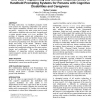Free Online Productivity Tools
i2Speak
i2Symbol
i2OCR
iTex2Img
iWeb2Print
iWeb2Shot
i2Type
iPdf2Split
iPdf2Merge
i2Bopomofo
i2Arabic
i2Style
i2Image
i2PDF
iLatex2Rtf
Sci2ools
CHI
2005
ACM
2005
ACM
End user programming and context responsiveness in handheld prompting systems for persons with cognitive disabilities and caregi
Providing instructions via handheld prompters holds much promise for supporting independence for persons with cognitive disabilities. Because users of these tools are paired ? caregivers who make scripts and a person with cognitive disabilities who uses them - designing such a system presents unique meta-design problems. The problems of changing content and configuration on a handheld computer, as needs and abilities change of the users with cognitive disabilities, produce a critical need for end-user programming tools. This paper describes the design and testing of the MAPS (Memory Aiding Prompting System) system, consisting of a handheld prompter and a multimedia editing tool for script creation, storage, and modification. The unique meta-design challenges of supporting end-user programming of context-responsive systems, and its broader implications, are presented. Author Keywords End-user programming; assistive technology; technology abandonment; context aware mobile systems ACM Cl...
CHI 2005 | Cognitive Disabilities | End-user Programming Tools | Human Computer Interaction | Keywords End-User Programming |
| Added | 30 Nov 2009 |
| Updated | 30 Nov 2009 |
| Type | Conference |
| Year | 2005 |
| Where | CHI |
| Authors | Stefan Carmien |
Comments (0)

